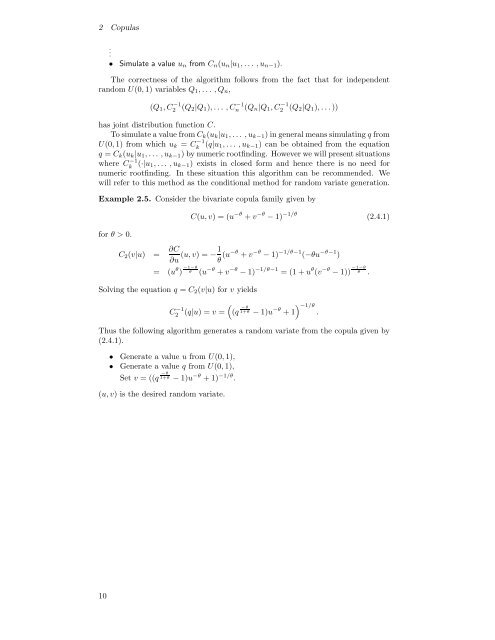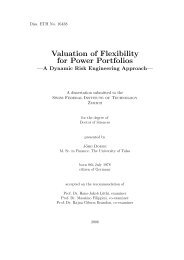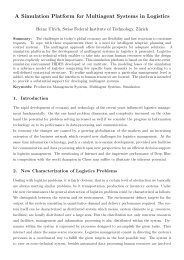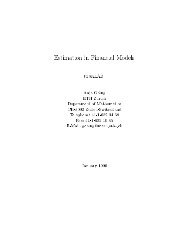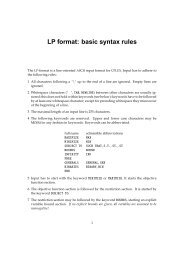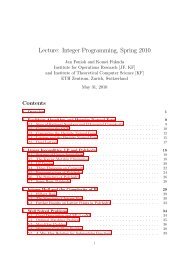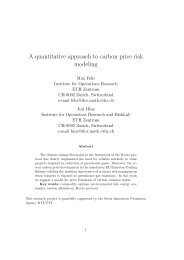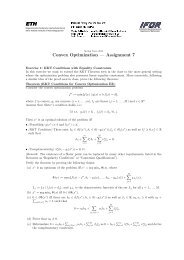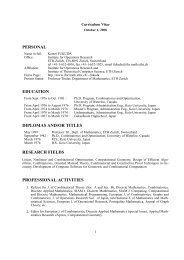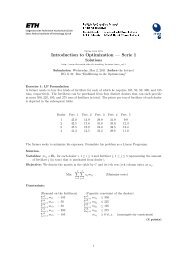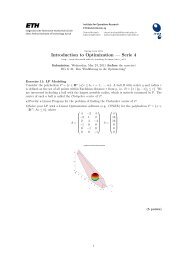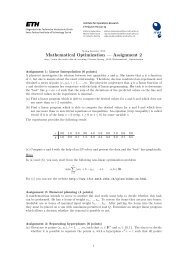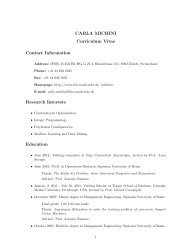Modelling Dependence with Copulas - IFOR
Modelling Dependence with Copulas - IFOR
Modelling Dependence with Copulas - IFOR
You also want an ePaper? Increase the reach of your titles
YUMPU automatically turns print PDFs into web optimized ePapers that Google loves.
2 <strong>Copulas</strong><br />
.<br />
• Simulate a value u n from C n (u n |u 1 ,... ,u n−1 ).<br />
The correctness of the algorithm follows from the fact that for independent<br />
random U(0, 1) variables Q 1 ,... ,Q n ,<br />
(Q 1 ,C2 −1 (Q 2|Q 1 ),... ,Cn<br />
−1 (Q n|Q 1 ,C2 −1 (Q 2|Q 1 ),...))<br />
has joint distribution function C.<br />
To simulate a value from C k (u k |u 1 ,... ,u k−1 ) in general means simulating q from<br />
U(0, 1) from which u k = C −1<br />
k<br />
(q|u 1,... ,u k−1 ) can be obtained from the equation<br />
q = C k (u k |u 1 ,... ,u k−1 ) by numeric rootfinding. However we will present situations<br />
where C −1<br />
k<br />
(·|u 1,... ,u k−1 ) exists in closed form and hence there is no need for<br />
numeric rootfinding. In these situation this algorithm can be recommended. We<br />
will refer to this method as the conditional method for random variate generation.<br />
Example 2.5. Consider the bivariate copula family given by<br />
for θ>0.<br />
C(u, v) =(u −θ + v −θ − 1) −1/θ (2.4.1)<br />
C 2 (v|u) = ∂C<br />
∂u (u, v) =− 1 θ (u−θ + v −θ − 1) −1/θ−1 (−θu −θ−1 )<br />
= (u θ ) −1−θ<br />
θ (u −θ + v −θ − 1) −1/θ−1 =(1+u θ (v −θ − 1)) −1−θ<br />
θ .<br />
Solving the equation q = C 2 (v|u) forv yields<br />
C −1<br />
2 (q|u) =v = (<br />
(q −θ<br />
1+θ − 1)u −θ +1) −1/θ<br />
.<br />
Thus the following algorithm generates a random variate from the copula given by<br />
(2.4.1).<br />
• Generate a value u from U(0, 1),<br />
• Generate a value q from U(0, 1),<br />
Set v =((q −θ<br />
1+θ − 1)u −θ +1) −1/θ .<br />
(u, v) is the desired random variate.<br />
10


